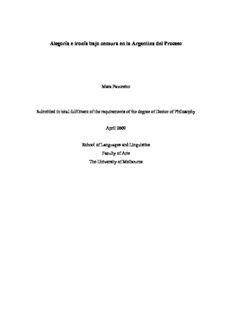
Alegoría e ironía bajo censura en la Argentina del Proceso PDF
Preview Alegoría e ironía bajo censura en la Argentina del Proceso
Alegoría e ironía bajo censura en la Argentina del Proceso Mara Favoretto Submitted in total fulfilment of the requirements of the degree of Doctor of Philosophy April 2009 School of Languages and Linguistics Faculty of Arts The University of Melbourne 2 3 Abstract During the period of military government in Argentina (1976 – 1983) a machinery of censorship was imposed. The state had a systematic plan of cultural repression and manipulation of public opinion. Even though there was not an official censorship office, the regime had an organised and sophisticated operating control over publication and public performance. However, the dissident writers and lyricists examined in this study developed strategies of resistance that depended largely on allegory and irony to convey subtle and oblique oppositional messages. By means of a detailed rhetorical analysis of a varied literary and popular corpus this study examines the functioning of allegory and irony under the constraints of censorship. The corpus includes the musical production of one of the most outstanding representatives of the rock nacional movement and four novels. The fictional narratives selected are divided into two symmetrical groups: in each group, one novel is written by a female writer and the other by a male author; one has reached a large readership and popularity while the other had a delayed reception but has won critical acclaim. Far from repressing forms of expression, the regime’s censorship policies fueled creativity in authors and composers. Irony and allegory were adapted to new necessities. While the former was used as a means to avoid political commitment, a use identified in this study as evasive irony, the latter schooled the reader in alternative ways of thought at the same time as it allowed multiple interpretations. This thesis shows that irony and allegory, as literary figures, can evolve and assume new functions, adapting themselves to the different political circumstances in which they are used. 4 5 This is to certify that (i) the thesis comprises only my original work towards the PhD except where indicated, (ii) due ackowledgement has been made in the text to all other material used, (iii) the thesis is less than 100,000 words in length, exclusive of tables, bibliographies and appendices. 6 7 A Favo 8 9 Acknowledgements I would like to express my gratitude to my supervisor, Dr. Chris Andrews, who continually supported my project and enriched it with his genius and inquisitive spirit. Without his guidance, patience and persistence the completion of this thesis would not have been possible. I would like to thank the Co- supervisor of my thesis and Convener of Spanish, Dr. Lara Anderson, for her constant support and encouragement during the whole process. I would also like to thank Ms. Martha Herrera, who shared her personal library with me and engaged in long chats that kept my enthusiasm alive. I am deeply grateful to the University of Melbourne, which provided me with financial support and access to the best libraries and databases to be able to complete my project. Finally, my thanks to my son, my family and friends for their love, understanding and patience that sustained me to the end of my PhD. 10
Description: